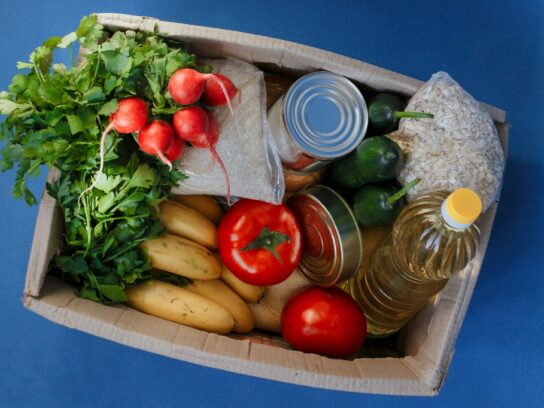
The new domestic policy bill President Trump signed into law on July 4 will likely have a major impact on lower income, elderly residents, and people with disabilities.
The law includes significant cuts to Medicaid and Supplemental Nutrition Assistance Program (SNAP), which many analysts say will likely drive up food insecurity. State data on the latest figures show food insecurity in Maryland rose from 9.7 percent in 2021 to 13.3 percent in 2023.
Food Insecurity in the County
Heather Bruskin, director of the Montgomery County Office of Food Systems Resilience (OFSR) told MCM while it is difficult to ascertain the exact number of people in the County who are dealing with food insecurity, about 300,000 residents live below the self-sufficiency standard. That means these residents do not bring in enough money to cover their cost of living.
Reduction in SNAP Benefits, New Work Requirements
Analysts say the provisions of the new law may make it even tougher for the poor to meet their basic needs. The law will reduce SNAP benefits by $1 trillion dollars over the next 10 years. It also will extend work requirements for SNAP recipients. For example, able-bodied persons will have to work at least 80 hours a month until they turn 64 years old. Previously, the age limit was 54 and some parents were exempt from the work requirement if they had children. Parents now must work if their children are between 14 and 17 years old.
Governor’s Reaction
“This so-called ‘Big Beautiful Bill’ marks a direct and heartless assault on the American people,” said Governor Wes Moore in a statement released soon after Congress approved the legislation. “Neither Maryland nor any other state across the country has the resources to fill the massive hole that the federal government created in our social safety net.”
Moore went on to say that the new law will hurt 684,000 Marylanders that rely on food assistance to pay for their groceries. This will disproportionately impact working families, seniors, children, veterans, homeless individuals and people with disabilities.
“This bill makes our country less affordable, less healthy, and more debt-ridden while kicking millions of people off their health care and decimating food assistance nationwide,” Moore added.
A Loss of 40 Meals Per Month
Capital Area Food Bank President and CEO Radha Muthiah echoed the Governor’s sentiments in a statement to MCM. She added sobering facts on how the cuts in funding will lead to missed meals for area families.
“Based on early assessments of state-level data, we expect that nearly 50,000 families in our service region will lose an average of $171 per month — or a loss of roughly 40 meals per month. While we are planning to ramp up our existing food distribution, state-level advocacy efforts, and partnerships to support long-term financial stability for vulnerable families, we know that we cannot fully fill this gap alone,” Muthiah explained.
The Emergency Food Assistance Program (TEFAP) and another program that enabled the Food Bank to purchase more fresh food from local farmers also are at risk of no longer being able to serve the community, according to Muthiah.
“These changes are expected to increase need at a time when we’ve seen decreases to the food and funding we receive through the federal government,” Muthiah explained. “Now more than ever, we will need the support of our incredibly generous community to help those who are losing access to SNAP. As states prepare to take on increased costs to operate this critical program, we urge them to maintain their current benefit structures so that SNAP remains available to those who need it in Montgomery County and across our region,” Muthiah told MCM.
Congressman Jamie Raskin Calls Out New Law
Rep. Jamie Raskin (D) of Maryland’s 8th Congressional District also said the new law will have a devastating impact on families already struggling in the County.
“President Trump and Republicans in Congress are pickpocketing students’ lunch money to hand more tax breaks to millionaires and billionaires. In Maryland, the average SNAP beneficiary now receives $184 per month. Countless nutritional benefits face elimination or reduction by this big, dreadful bill. These are terrible priorities,” Raskin told MCM.
Assessing the Future
State, regional and local partners are still trying to figure out the law’s impact on residents, said Bruskin. They will examine both the immediate and long term implications. Bruskin added that her office does not receive federal funding. Instead, the County financially supports its mission.
“This underscores the County’s commitment to supporting food access and long-term resilience for our residents. While our programs are currently stable, there is a layer of support nestled with a lot of critical state and federal programs,” Bruskin said.
“We still need guidance from the federal agencies on the changes.” Bruskin explained.
Calculating SNAP Benefits
One area of concern is how the federal government will calculate future SNAP benefits. Currently, the government allows residents applying for benefits to deduct fixed costs like heating and other utilities from their total income. The new law eliminates many of those deductions.
“Benefits may not keep up in the long term with the actual costs of feeding a family,” Bruskin said.
Shifts Administrative Costs
The new law also shifts the administrative costs for SNAP. Previously, the federal government and the state split the costs 50-50. However, that will change. The states will now be responsible for 75 percent of the costs while the federal government will have 25 percent.
“It’s unknown at this time what that will look like for our local partners who are community based organizations. The impact on the nonprofit sector could be significant,” Bruskin told MCM.
Elimination of SNAP Ed Program
Another change under the new law is the elimination of the Snap Ed program. That will take effect by October 1. The program sent nutrition experts to about 30 schools in the County. The experts provided information about healthy eating, obesity prevention, and other food-related issues to students in need. The students could then share the information with their families. The program also included some cooking demonstrations.
The Residual Impact of SNAP Cuts
The cuts will affect more than just the people who depend on SNAP benefits to meet their basic needs. The local retail and agricultural industries also will lose money, said Bruskin.
“Snap dollars are spent in grocery stores. Recipients spend about $12 million every month in Montgomery County. Reductions also will impact our farmers markets who accept SNAP dollars,” Bruskin said.
The White House Position
The White House disputes many of the concerns some people have raised about the new law. The Trump Administration said the cuts will protect and strengthen SNAP. The Administration claims fraud, waste, and abuse currently exists in the program.
“SNAP was intended to be a temporary help for those who encounter tough times,” said a White House spokesperson. “Now, it’s become so bloated that it is leaving fewer resources for those who truly need help. We are committed to preserving SNAP for the truly needy.”
Community Concern
“There’s a lot of concern in our community about what is ahead,” said Bruskin. “Our goal is to try to be as informed as possible. Therefore we can be supportive partners in the most effective and efficient way we can,” she added.
Meantime, the Capital Area Food Bank is always in need of donations. Those who have the means to give and who want to help can donate online at: visit: give.capitalareafoodbank.org.


Comments are closed.